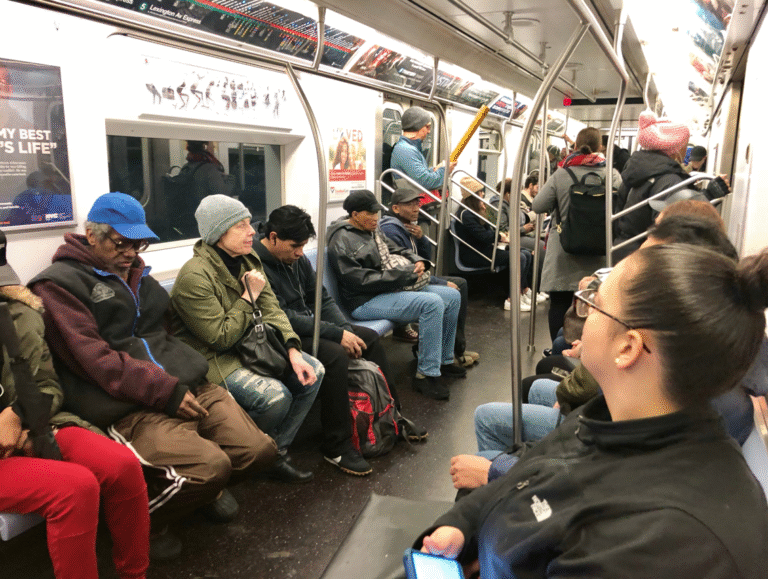A study found other distasteful acts, or “pet peeves”, on the commute to work include chewing loudly and sitting next to someone even when there’s other seats available. Talk about no personal space!
The research* surveyed 2,000 British workers to analyse what grinds their gears when it comes to travelling to work, and whether this plays a part in them wanting to go to the office altogether.
The number one dislike is people speaking loudly on the phone, with almost half (42%) of working Brits regarding this as the most infuriating thing that can happen on a commute. Make sure to be mindful of others next time you’re taking a call on the train!
The second big no-no, at 39%, is when people play music out loud, a trend also known amongst the younger generations as “bare beating”. The third worst act is when people sneeze or cough without covering their face (27 %) – yuck! Followed by people who put their feet on the seats (29%) and eat or chew loudly (24%).
The UK’s top 10 biggest commuting pet peeves
- Speaking loudly on the phone – 42%
- Playing music out loud – 39%
- Sneezing/coughing without covering your face – 34%
- Feet on seats – 29%
- Eating/chewing loudly – 24%
- Anti-social behaviour – 22%
- Sitting next to someone even when there’s other seats available (lack of personal space) – 20%
- Leaving rubbish behind – 18%
- Not waiting in turn – 17%
- Eating pungent food – 14%
How often do working Brits experience these pet peeves?
With the average commute to work taking 27 minutes, according to ONS data, there’s plenty of time to experience this frustrating behaviour.
More than half (51%) of all British commuters will experience a pet peeve, similar to the ones listed above, at least once a week. A further quarter (24%) claiming they must endure them on multiple occasions a week.
Around a third (31%) of commuting Brits would react by merely sitting there in silence, but filled silently with anger. However, one in ten (10%), who are not as relaxed, say they would confront the person asking them for an explanation into their behaviour.
Shockingly, one in five (20%) who were surveyed admitted to committing one of these pet peeves themselves while on their way to work.
How do Brits commute into work?
British working habits are constantly evolving to adapt to the changing demands of work-life pressures.
The survey revealed that only seven percent of working Brits have never commuted to work, meaning the majority will be exposed to these grumbles at some point in their career. But since the Covid Pandemic, most working Brits have adopted a ‘hybrid’ policy, as a quarter (25%) say they commute less than once a week.
For those that that commute to work, half (50%) say they take the train, with the average train journey taking 63 minutes, according to ONS data.
More than a third of commuters (36%) say they take other forms of rail such as the tube or tram to get to work, whilst one in ten (10%) spend at least £50 a week commuting by car.
What are the top ‘offending industries’ of commuting pet peeves?
- Agriculture – 59%
- Tech – 34%
- Art – 33%
- Construction – 31%
- Food – 27%
Those working in agriculture are the biggest offenders of commuting pet peeves, with three in five (59%) saying they have committed a pet peeve, much greater than the national average of one in five (20%).
On the other hand, retail workers are the most unlikely to commit a commuting pet peeve, with around one in nine (11%) claiming they have.
According to the study, marketing professionals experience these the least, with two-thirds claiming they commute less than once a week, less than any other industry.
Laura Akano, Etiquette Expert at Polished Manners, commented: “When travelling to work, it’s important to remember that public transport is a shared space, not an extension of your home. Good etiquette goes a long way to ensure a smoother, more pleasant journey for everyone.
“Some of the golden rules of etiquette when using public transport are to always have your ticket ready, avoid sitting on priority seats, and keep your feet and bags off the seats. Don’t bring or eat food with strong smells, as the smell will linger and make the environment uncomfortable for other passengers, and if eating food try to do it as respectfully as possible.
“If someone is being inconsiderate on your commute to work, make sure to use discretion. It’s okay to politely ask someone to move their bag if it’s on a seat, but for more serious issues, it’s safer to alert a member of staff. If possible, move to another carriage or wait for the next transport to arrive.
“Poor commuting etiquette can have a bigger impact than people realise – it can leave passengers feeling irritable, stressed or emotionally drained. For some, if the experience is so unpleasant, they will begin to avoid public transport altogether to protect their general well-being, fostering a ‘work from home’ culture.”
Samantha Wilcox, Organic Manager at tombola said: “Our research focuses on the everyday frustrations of commuting, shining a light on some of the nation’s biggest pet peeves.
“Your morning sets the tone for the day and the commute to work can significantly influence how the rest of the day unfolds. By highlighting what British workers find frustrating, we are hoping to make it a more pleasant journey for all commuters, with a healthy dose of humour thrown in. Because, let’s face it, commuting could do with a bit more politeness here and there!”
Study by tombola: https://www.tombola.co.uk/tombola-talks/brits-least-favourite-things-about-commuting






